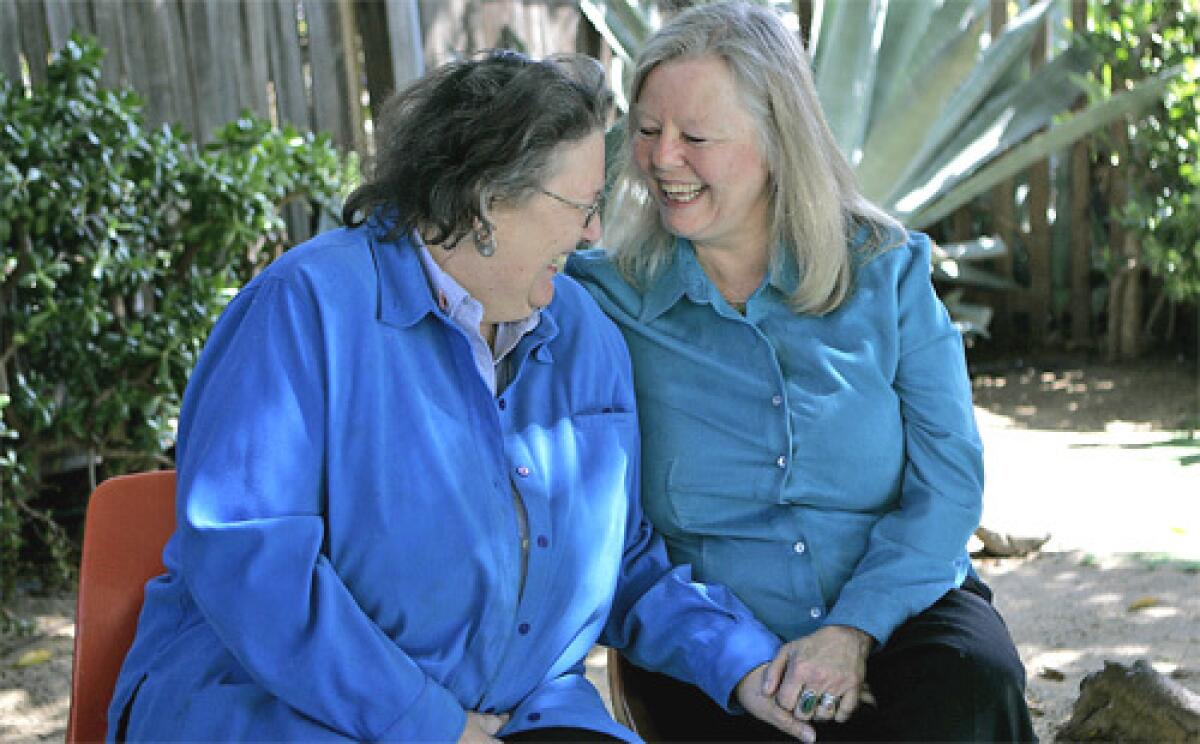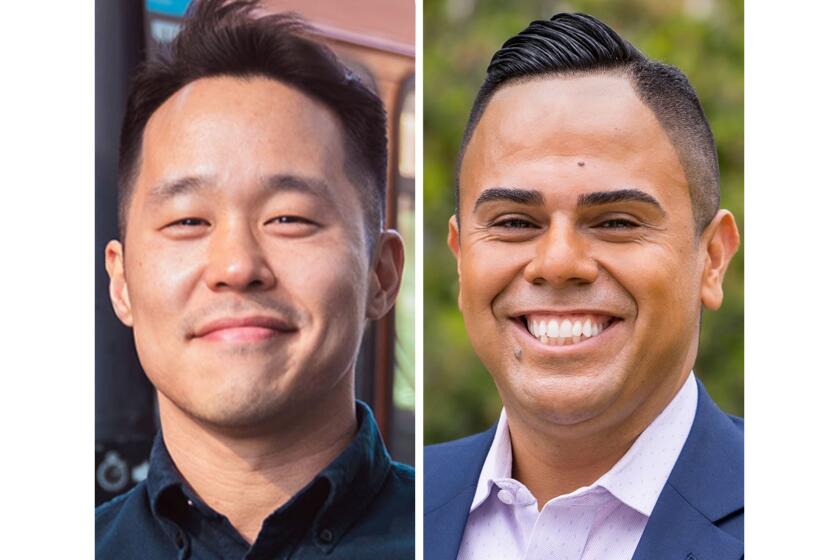Same-sex union -- it’s personal

When Jackie Goldberg and Sharon Stricker headed to San Francisco to get married four years ago, they saw their wedding as a political statement. It surprised them both when, halfway through the ceremony on the steps of the City Hall rotunda, the usually stalwart Goldberg burst into tears.
“It felt much different than I expected,” Goldberg said Wednesday, a few days shy of the March 8 anniversary. “I thought I was going to be proud and pleased and happy. But I didn’t expect to be emotionally moved.”
FOR THE RECORD:
Song title: A California section article March 6 about same-sex marriage described passengers on a Southwest Airlines flight as singing, “I’m Getting Married in the Morning.” That is a line from the song, whose title is “Get Me to the Church on Time.” —
Goldberg, a former member of the California Assembly, Los Angeles City Council and Los Angeles Board of Education, and Stricker, a poet and activist, are among the thousands of same-sex couples for whom Tuesday’s hearing before the California Supreme Court on whether gay people have the constitutional right to wed was as personal as it was political.
They had joined the rush to San Francisco after Mayor Gavin Newsom, arguing that to prohibit same-sex marriage violated the equal protection clause of the state Constitution, ordered gender-neutral licenses to be issued. More than 4,000 gay and lesbian couples married in February and March 2004 before the high court invalidated the licenses and the wedding train stopped as abruptly as it had begun.
Goldberg and Stricker weren’t the only ones to find their spontaneous wedding both more joyful and more serious than they expected.
Five other couples, all friends and well-known activists in the gay and lesbian community, met Goldberg and Stricker at City Hall to be married that day. Five of the six couples had been together for 20 years or longer.
“Each expected that it would be a good affirmation of a long relationship,” said state Sen. Sheila Kuehl (D-Santa Monica), the friend who officiated at the six couples’ unions and California’s first openly gay legislator. “But I don’t think any of them had expected to take marriage so seriously. We had essentially cut ourselves off from that expectation.”
Goldberg and Stricker had been all but married. They set up house in Echo Park in 1979, three years after first meeting. They raised a son together. The October before the San Francisco wedding, they celebrated their 25th anniversary with a big bash in a rented hall.
What the San Francisco wedding brought, Stricker said, was recognition from the larger community.
“It was as if the last piece was in place,” she said.
The year before, Goldberg had put many of the more practical pieces in place by orchestrating a sweeping domestic partner benefits law for California, promising many of the legal rights permitted to married heterosexuals.
Championing that hard-won legislation brought Goldberg death threats. Now former opponents are using the domestic partner law to argue that it makes same-sex marriage unnecessary.
Torie Osborn, who was among the six couples married that day by Kuehl, once believed that herself.
For Osborn and her then-partner of six years, Lydia Vaias, trekking to San Francisco was a spur-of-the-moment decision that had as much to do with the excitement of the time as a commitment to same-sex marriage.
“I’d been one of the skeptics who’d said, ‘Well, we have domestic partner laws, we don’t need marriage,’ ” said Osborn, 57, an advisor to Mayor Antonio Villaraigosa and former director of the Los Angeles Gay and Lesbian Center and the National Gay and Lesbian Task Force. “I had my feminist doubts about the institution.”
Today, of the six couples, Osborn and Vaias are the only ones no longer together, having split up, to Osborn’s regret, a year ago. Osborn may jokingly call herself a “gay divorcee,” but she has become a self-described “fiery warrior for marriage,” who followed Tuesday’s Supreme Court hearing on the constitutionality of same-sex marriage with far more than intellectual interest.
Although the wedding itself was “the most fun civil disobedience I’ve ever done,” Osborn said, it was what happened after the wedding that taught her a lesson that has outlasted the relationship. The newlyweds received more than 300 cards, e-mails, letters and presents.
“It was like standing there being showered with love and acceptance,” Osborn said. “And what I learned was that a wedding -- this ancient rite of passage into this institution of marriage -- is more than symbolism. It’s more than legal rights. It’s a shared communal experience. We crossed a line into a circle of recognition that we didn’t even know that we weren’t in before.”
Goldberg and Stricker agree. For eight months, not a day passed without someone coming up to hug and congratulate her, Goldberg said. They received cards and gifts 25 years after moving in together.
“The world knows how to acknowledge a marriage,” Kuehl said. “They congratulate you. They send presents. They understand that it is a significant and joyful milestone. No one knows what to do with a domestic partnership registry.”
What struck Jehan Agrama about her wedding was the reaction of her children and their friends.
Her longtime partner, artist Dwora Fried, 57, was not enthusiastic at first. Divorced, she thought marriage overrated. Agrama, 49, applied not-so-subtle pressure by proposing on Valentine’s Day -- with the couple’s two youngest daughters present.
Her motives were partly political. Although their own legal papers were in order, Agrama, a founder of the Gay & Lesbian Alliance Against Defamation, believed that being able to make medical decisions for each other and share custody of children and property should be a right, not a privilege unavailable to people with fewer means.
And she thought that getting married would be exciting.
It was. On the Southwest Airlines flight to San Francisco the morning of the wedding, the little girls wore festive dresses and the two women, long white gowns. Everyone on board sang, “I’m Getting Married in the Morning.”
Later the girls, then in the first and fourth grades, took the wedding license to school to show their friends.
“I heard you got married,” one of their friends later told Agrama. “It’s about time.”
When the high court ruled that their license was invalid, their fourth-grader was incensed.
“What do they mean?” she asked Agrama. “What do they know?”
Since then, a trial judge ruled in favor of same-sex marriages, but a Court of Appeal rejected that decision on a 2-1 vote. The state Supreme Court will issue its ruling within 90 days.
More to Read
Sign up for Essential California
The most important California stories and recommendations in your inbox every morning.
You may occasionally receive promotional content from the Los Angeles Times.










